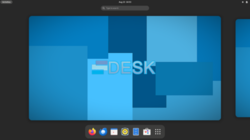Review: SDesk 2023.08.12
When I'm evaluating projects I tend to keep two questions in mind. One is whether the distribution accomplishes its goal. This is tricky to decide in SDesk's case because the distribution doesn't appear to have a specific goal or niche. The distribution seems to be aiming to be an ultra-modern, desktop-oriented, Arch-based project. However, it doesn't seem to set itself apart from the other approximately twenty Arch-based desktop distributions which do the same thing. Most of them run cutting-edge packages, use the Calamares installer, and a fairly small set of default applications. SDesk mostly does the same thing, but has more rough edges when it comes to the live media and default settings.
In other words I believe SDesk accomplishes its goal, but has a ways to go before it will feel polished and on par with other distributions in the same category.
The other main criteria I look at is how well the operating suits my needs. Can I fire it up and just start working? Is it easy to get the software I want? Do I pause and disable annoying notifications and animations? The more the experience becomes seamless for me, making me forget about the operating system while I work, the happier I am. SDesk was the opposite of seamless in my trial.
Some of the issues, I suspect, were hardware related. The regular crashing in the virtual machine and the lock-ups on my laptop, for example, were probably just unfortunate driver/compatibility issues. Other users likely won't encounter the same problems when it comes to maintaining a stable GNOME session.
However, there were other problems which kept showing up during my trial. GNOME Classic offered decent performance, but GNOME Shell did not and both were unusually heavy desktop environments. Apart from Ubuntu running GNOME and ZFS, I haven't seen memory stats this high before on a Linux distribution. Having the software centre not work with the underlying, native package manager was annoying and possibly a security concern.
There were lesser issues, like the installer demanding a complex password when most installers are content to let the user determine their own level of password security. Having the GNOME X11 session on the live media not work was another concern, especially when some users still have trouble running Wayland sessions, depending on their hardware.
SDesk is young, it hasn't had time to mature yet. Hopefully it does and sorts out some of the issues, adds more documentation, provides checksums for its media, and polishes the live media. For now, I'd say it's not yet ready to compete with other Arch-based desktop distributions, but perhaps a future release will catch up with the rest of the pack.

